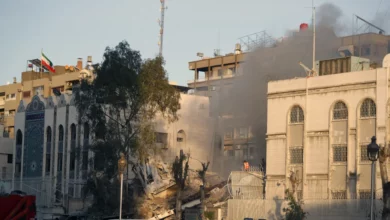
When Vladimir Kabunin signed up as a private military contractor, he saw a chance to make a wage much higher than any he could earn in his provincial Russian hometown.
Happy to be able to support his wife and son, the ex-police officer left Orenburg, nearly 1,500 km (940 miles) southeast of Moscow, and joined pro-Russian rebels fighting government forces in east Ukraine, a family friend and a relative told Reuters.
When fighting subsided there, he went to Syria to serve as a field medic with troops under Russian command, they said.
Kabunin was killed in Syria this year and his body was sent home, they said. But the government does not recognize he was in Syria, so he was buried without military honors and nothing on his grave shows he was killed in action.
Kabunin, who was 38, was one of hundreds of military contractors secretly recruited by Moscow for combat operations in Syria since Russia’s military operation began there in 2015, according to people familiar with the deployment.
According to a Reuters tally based on accounts from people who knew the deceased and local officials, at least 28 private contractors have been killed in Syria this year, and Russian consular documents seen by Reuters suggest the figure may be much higher.
The government denies recruiting and sending private military contractors to fight abroad. The defense ministry did not respond when asked about Kabunin’s case and the role of contractors in Syria, and has said previous Reuters reports on the contractors are an attempt to discredit Russia’s mission to restore peace to Syria.
But over two years, Reuters has spoken to dozens of family members, colleagues and friends of military contractors who have been killed in Syria.
Those familiar with the deployment say the contractors are under government command and have helped turn the tide of war in favor of Russia’s ally, Syrian President Bashar al-Assad, while hiding the scale of its military involvement and losses.
The fact that Kabunin and others like him are willing to sign up for such missions shows the Kremlin can draw on a large reserve of fighters who, as long as they are well remunerated, are willing to risk dying in the shadows.
WELL-TRODDEN PATH
Kabunin followed a path taken by many contractors: service in the military or security forces, a return to civilian life, a struggle to make a living, then a chance to make decent money fighting secretly for Russia, in Ukraine and then Syria.
Family members of Russian contractors say that in Syria they were paid up to $6,500 per month, which exceeds Russia’s average monthly wage more than 12 times.
“If you quit law enforcement bodies, you have only one way (choice) – to become a mercenary,” Vasily Karkan, a classmate of Kabunin at school, told Reuters.
Kabunin was shy as a child until he started kickboxing classes, Karkan recalled. The sport became a life-long hobby.
Kabunin obtained a degree in medicine and also studied law, but followed in the family footsteps by joining the police.
In 2010, he found a new job in a prison, where his wife also worked in a tuberculosis hospital. Kabunin’s role was to work with prisoners to obtain information and gather intelligence on planned escape attempts or potential unrest, but he left that job in 2012.
A spokesman for Orenburg prisons service said he had left of his own volition. A family friend spoke of job cuts and said he looked for a new job for about two years.
“There is no place to work,” the family friend said. “You can’t earn more than 10,000 rubles ($170)(a month) here.”
When fighting broke out in eastern Ukraine in 2014, Kabunin saw a job opportunity.
Moscow denies deploying active service troops in Ukraine or providing direct military help to the separatists. But Kabunin signed up with Dmitry Utkin, the leader of a group of Russian ex-servicemen fighting there who uses the nom de guerre “Vagner”, and, drawing on his medical degree, served as a military medic, his relative said.
COMBAT DEATH
When Utkin and his comrades deployed to Syria in support of Russia’s regular forces, Kabunin went with them, people familiar with the deployment said. As of April 2016, he was a field medic in a medical evacuation unit under Utkin’s command in Syria, according to an official in a Ukrainian law enforcement agency.
The agency says it has obtained the personnel records of 1,700 Russian contractors deployed in Syria, most of whom were earlier in Ukraine.
Kabunin left home for his last trip to Syria on Jan. 4 and was put in command of a medical company, but was wounded on Jan. 31 and died on Feb. 7 in Homs province, a relative said.
The relative knew this from former police colleagues of Kabunin, some of whom also served in Syria, and from his death certificate, which was handed to his wife Natalya. It was not clear how she was informed and who gave her the death certificate. She declined to speak to Reuters.
Relatives of other killed contractors say the news has come via friends or acquaintances, or by phone from people who say they represent a private company.
Kabunin was buried next to other family members’ graves in Orenburg, his portrait displayed on a cross showing a man with a shaved head in civilian clothes.
His wife received a compensation payment, according to the relative, who gave no further details.
According to accounts from relatives of other contractors killed in Syria, the employer typically pays out 3 million rubles ($51,227) in compensation to the next of kin when a contractor is killed.
Relatives of another dead contractor told Reuters that, in his case, the money was handed over to his widow in cash in a hotel in the southern Russian city of Rostov-on-Don.
“MISSION ACCOMPLISHED”
On a visit to Syria on Dec. 11, President Vladimir Putin declared mission accomplished for the Syrian operation and paid tribute to Russian servicemen who have been killed there.
There was no mention of the contractors’ losses. The government is under no obligation to disclose the deaths of non-regular forces fighting under its command and Russian military losses in Syria are a state secret.
Kabunin’s death did not dissuade his friend Valery Dzyuba, also a former police officer and kickboxer from Orenburg, from heading to Syria to fight as a military contractor.
Dzyuba’s family received a phone call from an unidentified man saying he had died on Aug. 20 but not specifying the circumstances. Dzyuba was killed in Syria, according to one of his classmates, Kabunin’s relative and an official in the village where Dzyuba was buried.




